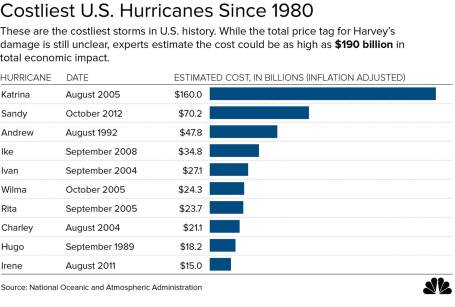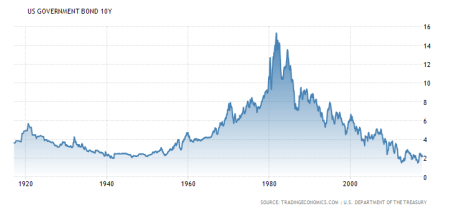Hurricane & Political Surprises as Dow Rises
Courtesy of Wade Slome, Investing Caffeine

[This article is an excerpt from a previously released Sidoxia Capital Management complimentary newsletter (September 1, 2017). Subscribe on the right side of this page for the complete text.]
It was a tumultuous month politically, economically, and meteorologically. The devastating destruction left in the wake of Hurricane Harvey’s 130 mile per hour winds and 50+ inches of rain displaced more than 30,000 people in Texas, destroyed upwards of 40,000 homes, and created estimated damages of $190 billion, making this storm the costliest hurricane in history (see table below).

But Hurricane Harvey wasn’t the only destructive force wreaking havoc on Americans. There were numerous geopolitical storms raining down over the newswires as well, including the following:
 North Korea Nuclear Standoff: The war of words between North Korean dictator Kim Jong Un and President Trump intensified significantly. When leader Kim Jong Un threatened to launch missiles at the U.S. mainland and Guam, President Trump responded by warning that North Korea would face “fire and fury,” if the U.S. is provoked and promised our military was “locked and loaded.” Defense Secretary Jim Mattis backed the president by cautioning North Korea it would be “game on,” if North Korean missiles were fired against U.S. territories. Tensions were raised after a provocative North Korean ballistic missile test aimed at the U.S. was launched over Japan into the Pacific Ocean.
North Korea Nuclear Standoff: The war of words between North Korean dictator Kim Jong Un and President Trump intensified significantly. When leader Kim Jong Un threatened to launch missiles at the U.S. mainland and Guam, President Trump responded by warning that North Korea would face “fire and fury,” if the U.S. is provoked and promised our military was “locked and loaded.” Defense Secretary Jim Mattis backed the president by cautioning North Korea it would be “game on,” if North Korean missiles were fired against U.S. territories. Tensions were raised after a provocative North Korean ballistic missile test aimed at the U.S. was launched over Japan into the Pacific Ocean.
Racial Strains in Charlottesville: A demonstration in Charlottesville, Virgina, protesting the removal of a Confederate statue of General Robert E. Lee, led to the death of protester Heather Heyer by a neo-Nazi participant (Ku Klux Klan and white nationalists were also participants in the protest). After many journalists criticized President Trump for a lukewarm response, his top economic adviser Gary Cohn stirred the political pot by saying, “I believe this administration can and must do better in consistently and unequivocally condemning these groups and do everything we can to heal the deep divisions that exist in our communities.” Attorney General Jeff Sessions called the incident “domestic terrorism.”
White House Shuffle: After strained relations with President Trump, White House Chief Strategist Steve Bannon became the latest staff departure. The other high profile firings / resignations include White House Communicator Director Anthony Scaramucci, White House Chief of Staff Reince Priebus, Press Secretary Sean Spicer, FBI Director James Comey, and National Security Advisor Michael Flynn.
Looming Government Shutdown: Will Congress agree on an increase in the $20 trillion debt ceiling, or will ideological factions within Congress sabotage an agreement that would prevent the government’s lights from shutting off and our country from defaulting on its debt obligations? The answer to this crucial question needs to be resolved by the end of this month. By chance, political lemonade could be made from natural disaster lemons. Due to the critical need for Hurricane Harvey disaster relief funding, Congress could be pressured into accelerating the signing of a combined legislative package that joins time-sensitive disaster relief funding with a resolution to the debt ceiling. If this wasn’t enough responsibility, Congress must also reauthorize the federal government’s flood insurance program, and reauthorize the Children’s Health Insurance Program (CHIP).
Terrorist Attack in Barcelona: A van plowed into pedestrians in the popular Las Ramblas tourist area in the center of Barcelona, Spain, killing at least 14 people and injuring more than 130. The ISIS terror group claimed credit for the attack and the police believe all 12 members of the terror cell are in custody or dead.
The Great Tax Hope: A cornerstone to the Trump administration’s economic agenda has been the promise of tax reform and tax relief to stimulate economic GDP (Gross Domestic Product) growth above 3%. Treasury Secretary Steve Mnuchin originally hoped to spearhead new legislation by the end of August, but now is hopeful a tax bill will reach the President’s desk for signing by the end of the year. Although details of the tax plan have been scarce, key components endorsed by many Republicans include, a simplification of the tax code that has not been overhauled since 1986; a reduction in corporate tax rates from 35% to 15%; repatriation of domestic profits trapped in overseas markets; and the abolishment of the estate tax. Time will tell what compromises and/or concessions will need to be made, if tax reform will succeed in achieving a different fate than healthcare reform.
Despite this storm of massively depressing news, all three major stock indexes (Dow Jones Industrial Average, S&P 500, & NASDAQ), once again, all notched gains for the month to new record highs. With the Dow now at a level of 21,948, the index is up a healthy +11% for 2017 with still a third of the year left. In what could turn out to be the worst-ever U.S. natural disaster and gloomy political headlines, how can stock prices keep going up? The short answer, as I have written continuously, stocks care about more important factors than politics and localized one-time disasters. Here are some of the factors the stock market does care about:
Rising Profits
On a day-to-day, week-to-week basis, stock prices can be extremely volatile. However, over the long-run, stock prices generally follow the direction of corporate profits. With profits at record levels (see chart below), and showing continued growth, observers should not be surprised by persistent price appreciation.

Source: Calafia Beach Pundit
Near Record-Low Interest Rates
In an environment where interest rates are near 75-year lows, and you are earning next to 0% on your bank savings, it’s no wonder that many shrewd investors have successfully flocked to stocks. This is not 1981, when you could earn upwards of 15% on a bank CD (stocks were much less desirable). As long as interest rates remain low, with healthy profits, stocks will remain attractive.

Source: Trading Economics
Consumer Confidence Builds
In spite of messy geopolitics and Washington gridlock, consumers are beginning to become desensitized to all the pessimistic noise. Two-thirds of our economy is driven by consumer spending, and with rising confidence (see chart below), this augurs well for the economy, corporate profits, and the stock market.

Source: Bespoke
Strong Jobs – Low Unemployment
Confidence is great, but you need to make money before you can spend it. And in order to make money, most people need a job. The good news is unemployment is at extremely low levels. In fact, as you can see from the chart below, unemployment claims are at the lowest levels since 1973. The unemployment rate of 4.3% also impressively dipped to a 16-year low. More discretionary income has also led to a sustainable recovery in the housing market, despite the low inventory of homes.

Source: Calculated Risk
Synchronized Global Recovery
Not many people realize it, but the economic size (GDP) of the Eurozone is a larger combined economy than the U.S. The chart below serves as a general proxy for our respective economies. What you can see is that since the 2008-2009 financial crisis, Europe (red line) has for the most part lagged the U.S. (blue line), but in recent quarters, Europe has caught up with us. Seeing the manufacturing indices above the 50% level is a good sign, because it signals expansion. If you were to examine other larger developed economies (like China and Japan), you would also notice economic growth has been picking up or holding steady at strong levels. Together, these economic data points mean we are currently experiencing a synchronized global recovery, which is positive for stock prices.

Source: Calafia Beach Pundit
Overall, while the newswires are buzzing with stories of political and natural hurricanes, there have been an abundance of positive factors that have pushed stock values to new record highs. The media loves politics, doom, and gloom, but your investments care more about profits, interest rates and the economy. Do yourself a favor and do not get emotionally involved in the panic headlines du jour. Instead, focus on the big picture and the many other opportunities for investment growth and preservation, otherwise your personal finances may turn into a scary natural disaster.
Wade W. Slome, CFA, CFP®
DISCLOSURE: Sidoxia Capital Management (SCM) and some of its clients hold positions in certain exchange traded funds (ETFs), but at the time of publishing had no direct position in any other security referenced in this article. No information accessed through the Investing Caffeine (IC) website constitutes investment, financial, legal, tax or other advice nor is to be relied on in making an investment or other decision.



